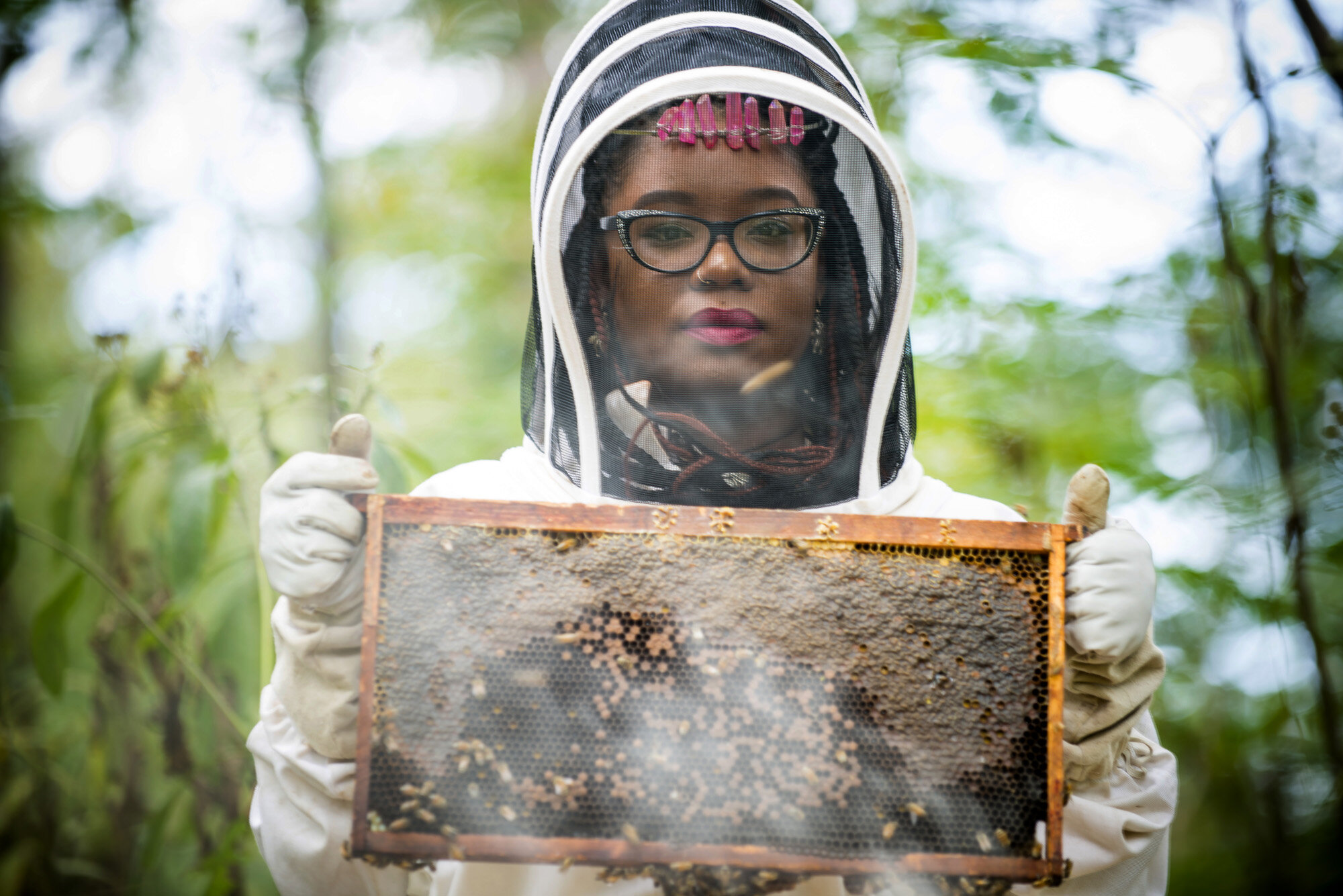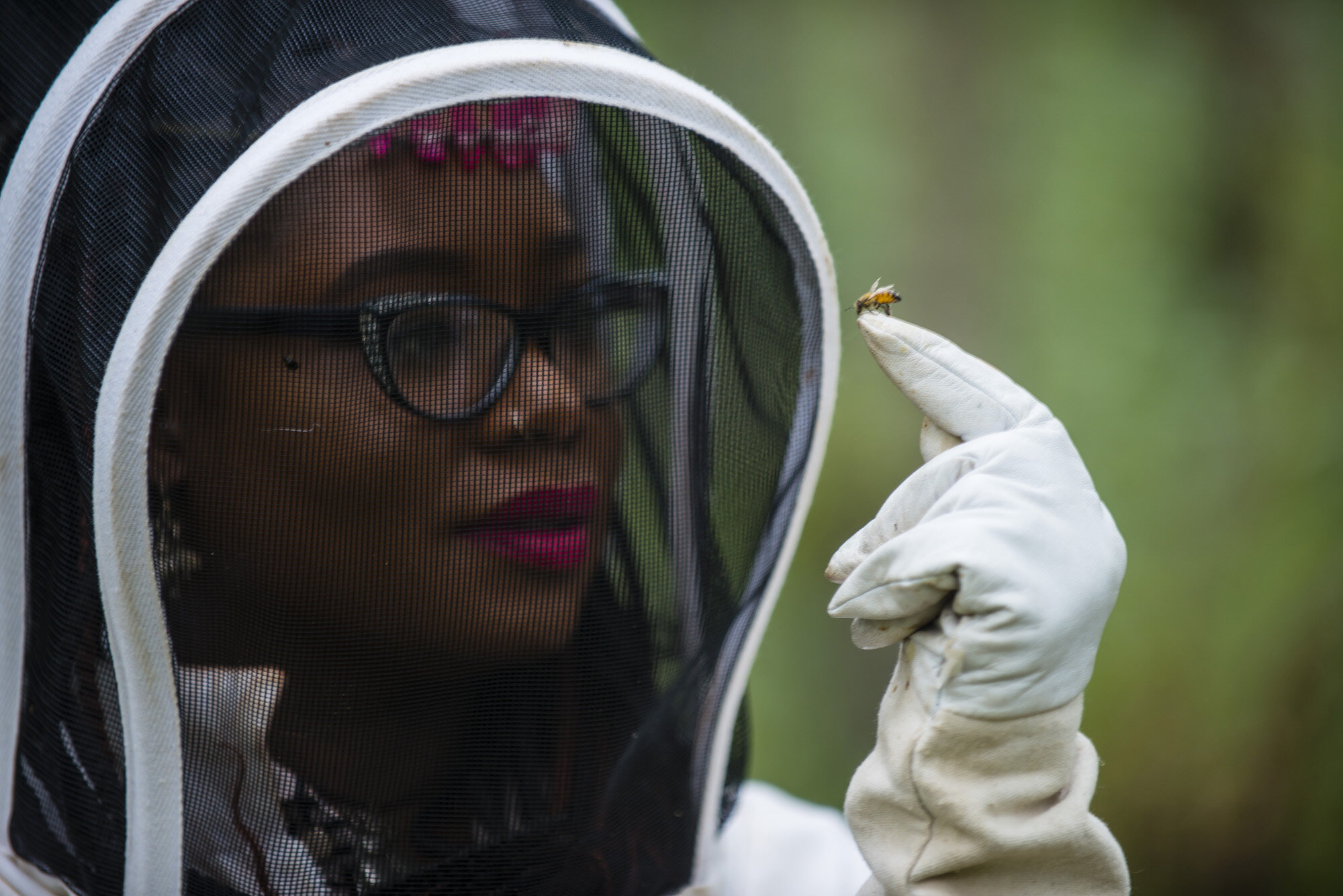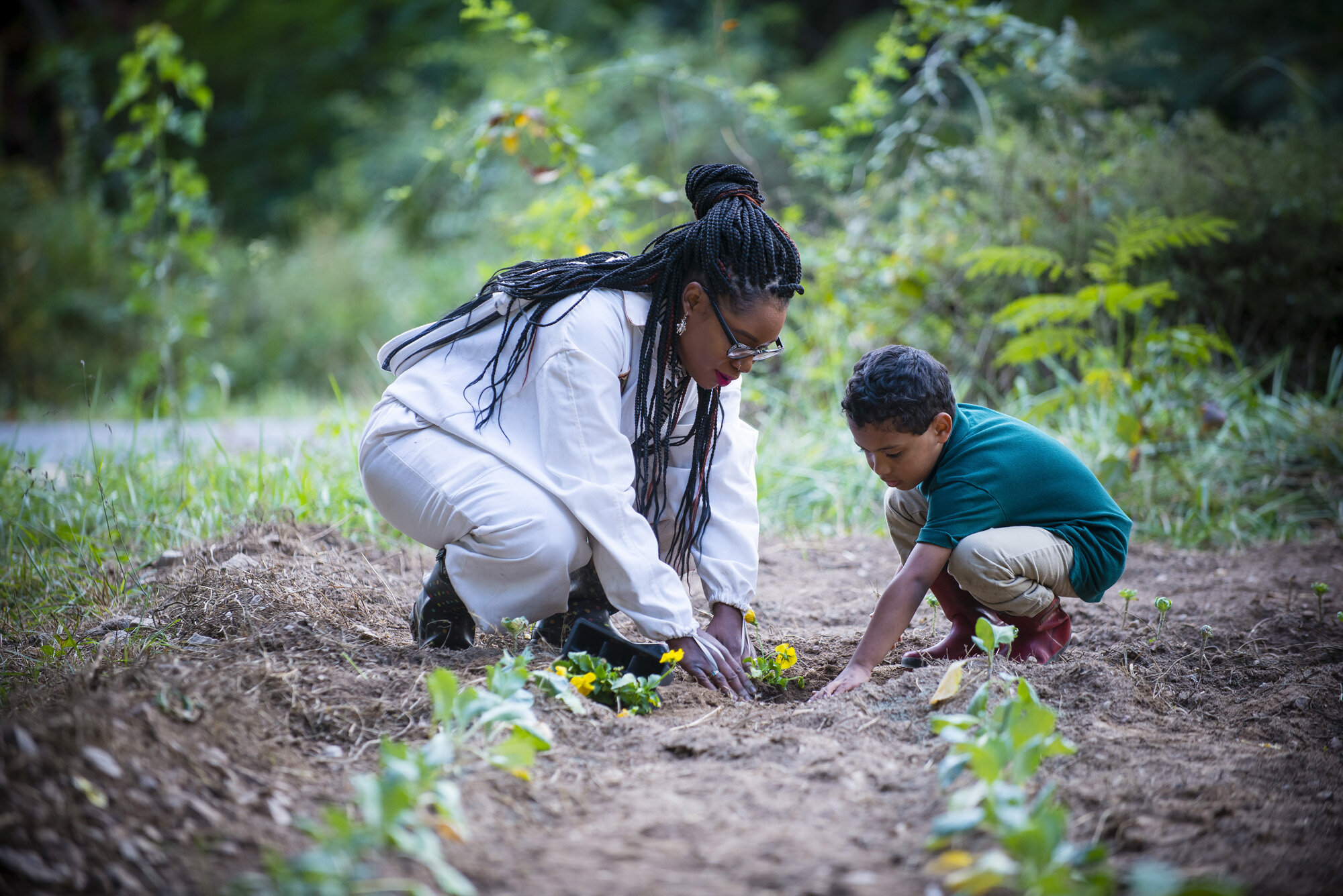The Lipstick Queen of Farming
/By Christine Rucker
In Samantha Foxx’s front yard, there’s a single row of sunflowers still standing tall at the end of October. They seem to stand in defiance of something. They tower over the mailbox and into the road in the working-class neighborhood in Winston-Salem, North Carolina, where Foxx lives and runs Mother’s Finest Urban Farm. You can’t help but notice the sunflowers, still thriving despite the unusual heat that clings to the fall air.
They hold an elegance and determination strikingly similar to the woman who planted them.
It’s not often I meet someone and feel an immediate kinship, but that happened when I met Samantha Foxx. I would soon find our friendship — and my mind — expand around her world, and the challenges and joys she finds there.
Samantha greets me at her front door wearing a church hat, a form-fitting dress and cat-eye glasses, with sparkles. She gives me the tour of her compact farm of vegetables, chickens, honey bees, and a newly planted rows of collards, all on about a quarter-acre plot of land.
Although she was born here, she left North Carolina for Chicago at the age of 13 when her uncle adopted her. Foxx studied cosmetology and worked in the hair and makeup artist industry until she was about 30-years old. She returned home to the South seven years ago with a hunger for a slower pace and a vision to work the land - while maintaining her personality and style.
“I was being adventurous when I wanted to learn about farming, so I worked on a local farm,” she says. “Let’s just say it was a traditional Southern farm. I was somehow talking about lipstick to one of the women at the farm and said, ‘One day we should wear red lipstick to work.’ The lady said ‘Oh no, you could never wear that here,’ and I was pretty discouraged by that. I think you need to always be true to being an individual. So, I began my own urban farm in the backyard of my home, and now I can wear anything I want.”
Samantha has been tending her land and business full-time for the past two years. She has a little bit of everything going on, but the main crops she’s growing this year have strong ties to her history. The collards were planted the day she got back from burying her grandmother, Christine Hunt, in eastern North Carolina. Her grandmother helped raise Samantha before her uncle stepped up to adopt her. Samantha says she can close her eyes and still see her grandmother pulling up collards to cook and put on the table for Thanksgiving.
The abundant crop of Scotch bonnet peppers, still popping with color late into the season, remind her of her father, who was from the West Indies. The peppers, along with honey and spices from her farm, are the base for her fire tonic, a classic folk remedy that is rising in use and popularity.
She grows the elderberries that go into her elderberry syrup. As more people look to alternatives to pharmaceuticals, the syrup and fire tonic are staples this time of year at the many local farmers markets where she sells - as well as in her own home, to keep her family healthy.
Farming is no easy way to make a living, much less for a woman of color. Samantha Foxx talks openly about how racism still affects black farmers in the South, and she never shies away from working to overcome that barrier.
When she stepped into her first Beekeepers Association class, she walked into a room filled with white men in their 40s and 50s, some of them wearing jackets with Confederate battle flags.
“I was the only black person in the room. They were looking at me like I was an alien,” she says. “I was just so foreign to what they were used to in that space. At first I wanted to leave, but then one of the men invited me to sit next to him, and the pressure starting lifting from me. I felt like something kind of shifted, maybe they were thinking, ‘Well, this is different, but let’s give it a chance.’ It was probably something that needed to happen there.
“I wanted to go into beekeeping because it was a challenge, but it was also about representation. Growing up, I never saw a black beekeeper, and because I never saw anyone like me doing it, I couldn’t place myself there doing it either. I wanted to challenge that and put myself out there being a beekeeper, not just by representing African Americans, but also giving my kids an opportunity to see what I didn’t see.”
Recent data from the U.S. Department of Agriculture show African Americans make up less than 2 percent of the country’s 3.4 million farmers. The Guardian reported this summer that 100 years ago, America had more than a million black farmers — and that today, the number is less than 50,000. The story of how they lost their land is part of the broader sweep of systematic discrimination.
Winston-Salem sits in the middle of Forsyth County. Out of 908 farms in Forsyth, only 10 are owned and operated by African American people. I live in Yadkin County, about 20 minutes outside Winston-Salem. Yadkin is mostly farming communities, but according to the most recent U.S. Census of Agriculture, we have no black-owned farms. The face of farming, in Yadkin, as in most of America, is, predominately, white and male.
None of this discourages Samantha.
“I believe representation is important, it’s important not only for black women, but women in general,” she says. “I’m glad I can be that voice (who says) that we can do it, too, and give women the boost to thrive in a male-dominated industry.”
Samantha Foxx knows how hard it is to thrive in difficult environments. She says she grew up too fast in a broken home — with abuse from both parents. Her best friend and brother, Bacchus Hunter, died in an accident when Samantha was in the eighth grade. “The straw broke,” she says, after her brother died, sending her mom into a spiral of grief and addiction.
But, she explains, it’s her experience growing up, the thankfulness she carries in her heart, for the family that stepped up to help raise her, that has called her to this work.
“I saw women who worked tirelessly and did everything they could for their family to keep them at their best,” she says. “It was in my soul to make wellness products. I created this [elderberry] syrup for my own child, and when I saw it help him, I decided to share it with my community. I went through every step to bring it to a professional level, meaning all the certifications I could possibly get. Then, I went a step further to centralize my ingredients and supply them from my farm as much as possible.”
Samantha says her grandmother Hunt taught her to keep high standards and take nothing halfway, and her uncle, for supporting her rebellious spirit instead of trying to smother it. They planted the seeds early on and gave her the drive to carve her own path, no matter how difficult.
Mother’s Finest is slowly growing into Foxx’s vision of becoming a family business. Her 6-year old son, Kingston, runs up the rows of freshly tilled soil and chases after the chickens. Then, he quickly changes into a small bee suit to help his mom check on the hives. Kingston is her constant sidekick. Foxx’s husband, Derrick Monk, is a graphic artist. He designed all her logos. Her 16-year-old son, Jaylen, and stepson, Derrick Monk Jr., all work in the kitchen with her to help bottle and package everything for the weekly markets.
She wants to give her sons a chance for a different narrative in life.
“I want to imagine a life where welfare doesn’t exist because those communities are planting seeds together,” she says. “We’ve been so beaten up as a race, and we’ve been told we can’t do things all our life. It’s systematic. I know what struggle is like. I know what it’s like to be broke. I know what it’s like to be homeless. So, I’m willing to work so I never go back there. I’m willing to sacrifice, and I’m not ready to rest. I’ve got these kids and my family to take care of. I’ve got goals.”
You can see the fire glow hotter inside her as she talks. It’s a fire Samantha wants to pass down to her children the same way her grandmother and uncle passed on their guidance to her.
“Those things you carry with you and you never forget” is how she describes them. “I want to stand up for farming, and I want to stand up for the trauma we experienced as a race in these fields. I want to teach these values to my children.
“I don’t mind talking with people about the traumatic experience with farming and slavery, those that want to listen walk away with a greater appreciation of our history. Most Southern men I’ve encountered are very proud of their history, and personally I think they have the right to be. I don’t want to take that away from them at all. It doesn’t make me upset that they are proud of who they are, or where they came from, just like I can be proud of who I am, and where I came from.”
Foxx is thinking of growing cotton, or maybe tobacco, in the spring. It’s an idea that surprises some folks.
“People look at me like I’m crazy,” she says. “They don’t understand why I’d want to grow crops that were so prominent during slavery. But the way we take over our lives again is to step back into those fields. I’m not a runner anymore. You face your fears by standing in the middle of them and staring them in the face.”
Foxx wants to teach kids about self-confidence and community building. She just completed her 4H certification and brings bee hives into elementary and middle schools. She explains the bees’ different roles in the hive and how that relates to our own roles in communities.
She hopes that her work will not only help kids learn about bee-keeping and farming but how to help individuals and communities grow and thrive.








